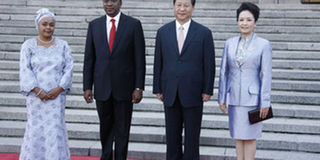China’s loan to push Kenya debt to Sh2.3trn

PHOTO | PSCU President Kenyatta and First Lady Margaret are welcomed by Chinese President Xi Jinping and First Lady Peng Liyuan at an official ceremony at the Great Hall of the People, Beijing, China on August 19, 2013.
What you need to know:
- Early in the week, President Uhuru Kenyatta led the government in signing several bilateral agreements that would see China, the second largest economy in the world, extend financial support to Kenya in a raft of economic partnerships.
China’s commitment to offer Kenya Sh425 billion loan will push the country’s total debt level past Sh2 trillion, with analysts warning of challenges in servicing the debt.
Total public debt, which stood at Sh1.9 trillion as at the end of May this year, has now soared to Sh2.3 trillion, the highest in Kenya’s history.
The amount has also pushed the foreign debt past the Sh1 trillion mark and made China the top bilateral and single largest lender to Kenya, displacing Japan.
It is, however, the pace at which the country is accumulating the debt that is worrying analysts. As of May this year, total external debt stood at Sh832.2 billion.
“Infrastructure development ultimately provides support to the economy in the long term and the Chinese financial inflow is certainly a boost to overall development. We are, however, likely to have serious challenges in servicing the debts,” University of Nairobi economics lecturer Dr Samuel Nyandemo told the Nation.
The country’s total debt was already past the 50 per cent GDP, at 52 per cent, by May 2013, a level experts say a country should start to get concern on its sustainability.
The government already faces a huge challenge in financing domestic debt that currently stands at more than Sh1 trillion.
The cumulative interest and other charges on domestic debt rose to Sh101.7 billion in the year to May 2013, compared to Sh74.2 billion over a similar period in 2012.
“If the investment can yield returns in a much shorter time, then it is a good move. If the repayment period given is longer than the time the projects to be invested in are to mature, then the projects could yield better results in the economy,” said head of Sustainable Aid in Africa International, Mr Alfred Okeyo.
Early in the week, President Uhuru Kenyatta led the government in signing several bilateral agreements that would see China, the second largest economy in the world, extend financial support to Kenya in a raft of economic partnerships.
One of the key projects that China is expected to support is the construction of a modern railway line connecting the port of Mombasa to Uganda through Malaba.
Another project is enhancing efficiencies at the port, a key trade route serving landlocked countries which include Uganda, Rwanda, South Sudan, Burundi and the Democratic Republic of Congo. Kenya is also constructing a port in Lamu as part of the Lamu and South Sudan Ethiopia Transport Corridor.
By May this year, China’s debt to Kenya stood at Sh63.8 billion ($750 million). The additional Sh425 billion ($5 billion) pushes the debt to almost Sh500 billion.




